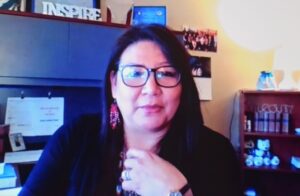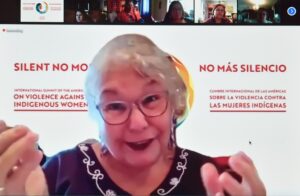Solidarity to stop violence against Indigenous women

By Kelly Anne Smith
OTTAWA— The shadow pandemic of violence leaves Indigenous women and girls more at risk than ever.
“We will be #SilentNoMore,” the Native Women’s Association of Canada (NWAC) said to open the International Summit of the Americas on Violence Against Indigenous Women.
Indigenous women leaders, lawyers, human-rights advocates, and government officials came together virtually to share best practices to keep Indigenous women, girls and gender-diverse people safe. The two-day event held on Mar. 29 and 30 was hosted by NWAC.
NWAC held the summit to take action against the lack of change since the Canadian Murdered and Missing Women and Girls (MMIWG) inquiry and its 231 Calls for Justice.
Keynote speaker from Thunder Bay, Detective Sergeant Alana Morrison, has been a police officer with the Nishnawbe Aski Police Service (NAPS) for 18 years. Her traditional name is Screaming Eagle Woman and she is from the treaty territory of Robinson Superior and a member from Biinjitiwaabik Zaaging Anishinaabek (formally known as Rocky Bay).
Morrison’s talk was Caring for those who have been harmed in our isolated and road access communities in Canada. She explained that 32 of the 200 officers of NAPS are women who police 34 communities in a land base of about two-thirds of Ontario. Morrison says she speaks on behalf of the hundreds of survivors she has worked with.
“Caring for Indigenous women is universal and across all nations. That pain itself is plaguing women across the world.”
Morrison spoke on NAPS efforts to assist women who have been harmed. She has specialized in both domestic and sex crimes against women and specialized in offences against children.
There is an urgent need for more resources Morrison insists as domestic and sexual abuse incidents increase.
“As the largest First Nation service in Canada, we need to have a program in place to deal with those 20 to 25 reported domestics a month, and that’s per region,” she explained. “We are dealing with an influx of domestics (domestic violence incidents in which often a woman is harmed) that are not only caused by day-to-day issues in the communities but also the impacts of COVID and the worldwide pandemic.”
“Many women are dealing with what I call double isolation. They were isolated in their communities because planes were not able to come and go. And then there was further advice to remain in your home.”
She calls for urgent funding for a program for survivors of domestic violence. Morrison explained that often in small communities, women don’t have cell phones or access to a safe shelter. She says a shift to immediately help survivors of intimacy violence and sexual offences has been successful.
The global COVID-19 pandemic has been dangerous to the Indigenous population in Brazil.
On day one of the summit, Marize Vieira de Oliveira Guarani, Presidenta, Associação Indígena Aldeia Maracanã, stated Indigenous women in Brazil face armed conflicts, violence, rape, no water, no food, and no access to medicine.
Vieira de Oliveira Guarani states there is no government support for Indigenous women and calls for data collection for policy change.
“We are not in the statistics.”
Jennifer Andrea Montaño Granados at The National University of Colombia also reports that women are not being counted and are at risk of being physically and culturally exterminated.
From Chile, Antonia Urrejola Noguera, Inter-American Commission on Human Rights’ Rapporteur on the Rights of Indigenous Peoples, talked of the pandemic broadening and furthering the discrimination for Indigenous women already in a vulnerable situation.
“All of this is worsened by isolation. We know now, domestic violence sky-rocketing,” she explained. “The fact that women continue to face such challenges to assert their fundamental rights in a context of ongoing discrimination given the pandemic is all the more disheartening. The high degrees of femicide, of disappearances, sexual violence, and so many other types of violence, with an array of obstacles, means the day when women, children, boys and girls, and adolescents will be able to have full justice is not yet with us.”

says President of the Native Women’s Association of Canada, Lorraine Whitman.
President of NWAC Lorraine Whitman urged summit participants to continue to meet and share ideas.
“The fact that police officers tuned in to listen is an indication that some are taking the violence against Indigenous women seriously,” she noted. “We have the will to take this forward…That is why we must make a commitment to do this again – to meet and share ideas… We say to bullies that we are not going to go away. We are not going to stand down until the killings and disappearances stop.”
In the spirit of Article 22(2) of the United Nations Declaration on the Rights of Indigenous Peoples, participants of the International Summit of the Americas on Violence against Indigenous Women have committed to creating an MMIWG Global Response Network. Specific work will include data collection, communications, police and justice, policy and research, families, healing and support.


